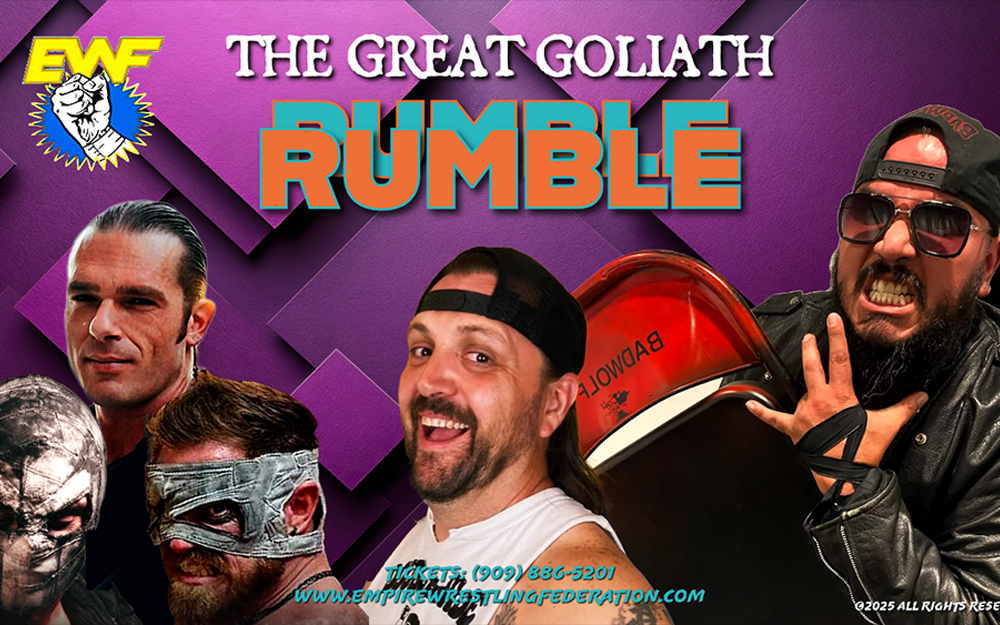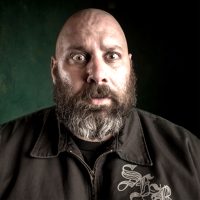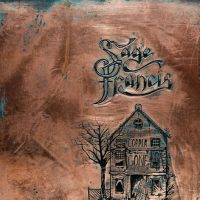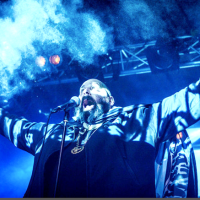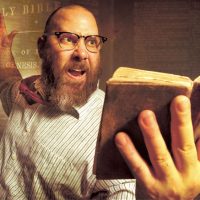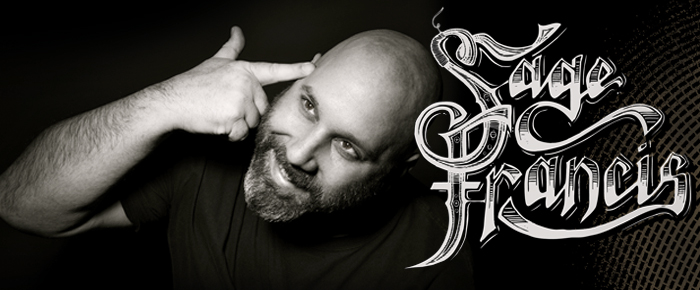
@ The Date Shed in Indio, Saturday, January 24, 9pm, 18+
Tickets, $25-$28 www.ticketfly.com/purchase/event/642923
By Lisa Morgan
Just coming off of a world wind, 100 show tour, with the last 45 in row ending in Japan, Paul William “Sage” Francis, American hip-hop recording artist and spoken word poet from Providence, Rhode Island, found the time and energy to grant CV Weekly an interview. Francis, who is also the founder of Strange Famous Records, began writing and recording original lyrics at age 8, being inspired by acts such as Run DMC and Public Enemy. According to artistdirect.com, Francis began sneaking out of his parent’s house at age 12 to participate in rap battles. Let me emphasize that he was from PROVIDENCE, RHODE ISLAND, a rural area. When Francis was 8 years old, it was 1984. The hip-hop scene had not yet become mainstream and most certainly was not readily available in his home town. Francis was a white boy, as far removed from the genre as a young boy could be. The fact that he was eventually signed to Epitaph Records as a hip-hop artist is nothing short of a passion driven miracle.
CVW: How did you even find this venue, and how did it become your life’s art?
Francis: I started off, naturally, as a writer. Even as a kid in fourth grade, I wasn’t just writing poems, but full stories. When I came across hip-hop, it was not popular in my town. My parents had very little music affiliation, and I grew up in a culture that was very homogenized. It was a very white-bred, small town. In fact, I still live in a very rural area, not a suburb. I don’t come out and try and represent the streets. I’m very honest about what I represent and where I come from. It’s the human experience that I’m most interested in – expressing through my music, the common thread in all people, no matter where they live or how they were raised. Hip-hop, just in its attitude and sound, was just so new and fresh to me. The way words fit together, and the way hip-hop used that was very inspiring to me.
I tried to learn as much about it as I could, year by year. There was not a wealth of information where I lived. This was well before google (and YouTube). There were some magazines that would have tid bits of information about Def Jam artists. The record stores didn’t even have hip-hop sections. You had to search through all the tapes and look for something that looked like it might be hip-hop…you know, look for a black person on the cover, look at how they dressed and the title of their songs, and then risk your full allowance for the week when you bought it. I devoured every little bit of information I could get from my pre-teens to early teens until it exploded into the main stream. College radio was a massive help. That’s where I found out the new artists to look out for…Public Enemy, Big Daddy Kane…that was the rabbit hole I fell down. I studied all these artists and tried to emulate them until I learned to develope my own voice. I never expected to have a career in hip-hop. There was no one like me in hip-hop, and there was no template for me. So I went to college and I played sports, I studied journalism but always worked on my rap songs and writing.
Battling was a big part of hip-hop, and that’s where I excelled. Just to get in front of a crowd and have a reason to boast about my skills or put someone else down to build myself up, that was big for me at that age. Eventually, you grow beyond that as an artist, but winning some of those big battles was part of why my name would pull up when Napster came around. After my songs were found, I was able to tour all over the world. My first tour was Sweden. Swedish kids were using Napster to search hip-hop. They found me and brought me out. That was in 1999. It’s been a long road. It was crazy to play these places again on this last tour.
CVW: How was that tour, playing for audiences where many don’t speak English?
Francis: A big part of my show is how I interact with my crowd, and how I use language. But when people can’t understand the language and the nuances of it, it becomes more difficult. I had to pull out some new tricks just for entertainment value. I was able to really hone my show, and have a lot of tricks up my sleeve for these shows. This show (Date Shed, Indio) will be kicking of 2015 for me. I wasn’t really plotting a west coast tour, but I’m glad Kristen reached out to me to make this happen. I’m really excited to get out of the freezing weather we’re having here (Rhode Island). It’s literally freezing, and not fun to be outside. It’s also good to just to keep the wheels spinning – an object in motion tends to stay in motion and that’s what I’m trying to capitalize on. But I’ve GOT to get out of this area right now. I’m dying’.
CVW: The new album, Copper Gone, seems to be less politics and more personal, especially the song, ‘Grace’.
Francis: Yeah, ‘Grace’. The song stems from the course of four or five long term relationships I’ve had since the early 2000s – a lot of the conversations going on in my head that were not going away, and the need to put them down on paper. Sometimes I wait for the worlds to make sense in the context of a particular song or mood of the beat. So when I finally got the music from Alexander Brown, the producer, that’s when it all started to make sense. I was able to go back into the archives combined with new material and squash it all down into one song. I probably could have broken that one down into a couple of different songs, but sometimes that’s how some of my favorite songs are made – taking a few songs and turning them into one that can be listened to a few different ways if you know what to look for. The chorus was inspired by an old song by a rap group called Poor Righteous Teachers. He starts off a song saying, ‘THIS IS NOT A LOVE BALLAD’. I always wanted to sample that, but when it came time to actually do the song, the sample didn’t have the same effect as just me saying it in a very plain manner.
I’ve gotten some grief from female fans over the years. I do a lot of relationship songs, a lot of break up songs. You might say I’m the Taylor Swift of my genre.
CVW: That’s going to make a great headline.
Francis: I was just thinking that I shouldn’t have said that.
There was this female in the crowd who asked me, in earnest, why I hate women. I was like, ‘Why do you think that?’ She said, ‘I feel like your songs are so hateful toward women.’ To be honest, I feel like men are truly shitty, and I feel women are truly shitty. My relationships inspire my songs and my relationships are generally with women. So if I’m attacking a woman through my words, I’m not verbally attacking the whole gender, just certain members of it. I don’t want it to ever sound that men are above women. I feel like I’m just as much of a piece of shit as they are. I don’t think most people should walk away with that idea. Some people just aren’t able to separate themselves from the preposition, I guess, and they feel it’s personal. I think they may be overly sensitive, and art may not be the best place for them to hang their hat.
Copper Gone is the first album Sage Francis has released completely independently after fulfilling his obligation to Epitaph Records. Though very grateful for the support of Epitaph on his first album, by the time he was on his second album, he felt he was doing most of the work himself. Still he had to meet his contractual obligation to produce three albums. Copper Gone is a heart-stripped, blazingly passionate work of pure, no holds barred, honest poetry delivered with strong rapid fire combinations that would impress Mohamed Ali. Perhaps Sage Francis’ craft has matured and evolved, but I’m confident he could still hold his own in a battle.
Learn more about Sage Francis at www.sagefrancis.net
Tickets can be purchased at www.ticketfly.com/purchase/event/642923
or at the Date Shed Box Office (760) 775-6699
Date Shed is located at 50725 Monroe Street, Indio, CA

























